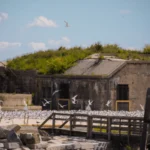Media Contact: Jordan Rutter, Director of Public Relations, 202-888-7472 | jerutter@abcbirds.org | @JERutter
Expert Contact: Mike Parr, President, 202-888-7486 | mparr@abcbirds.org | @michaeljparr

Royal Tern colony settling into new habitat on Rip Raps Island, an island at the mouth of the James River in Virginia. Photo by Meghan Marchetti, DGIF
(Washington, D.C., May 15, 2020) The Commonwealth of Virginia has come through for the waterbird colony that previously nested on the Hampton Roads Bridge-Tunnel’s South Island, a habitat impacted by ongoing construction. Rip Raps Island, located adjacent to South Island, was prepared in time to receive the birds returning from their winter habitat, with birds including hundreds of Royal Terns, Common Terns, and Laughing Gulls gathered so far and appearing ready to start a successful breeding season. To supply additional habitat, the Commonwealth has positioned barges nearby and covered them in a sand-gravel substrate to make the surface attractive for the nesting birds.
“The completion of this habitat project is a significant victory for our migratory birds and wildlife efforts in the Commonwealth,” said Ryan Brown, Executive Director of the Virginia Department of Game and Inland Fisheries. “The Department is grateful for Governor Northam’s support, as well as the assistance of our partner agencies and organizations, and proud of what we have collectively achieved.”
Mike Parr, President of American Bird Conservancy (ABC), has been an advocate for both the birds and Virginia’s leadership. “Governor Ralph Northam made ambitious commitments to ensure that the birds – the region’s largest waterbird colony – would be accommodated while also keeping the much-needed Hampton Roads construction project moving. He has kept those commitments, and I believe what we’re seeing is a lasting bird conservation legacy in the making. The Governor, Secretary of Natural Resources, and the Department of Game and Inland Fisheries (DGIF) all have our deepest appreciation and thanks.”
American Bird Conservancy and National Audubon Society’s Seabird Restoration Program supported the development and installation of a social attraction system on Rip Raps Island to lure the birds. The system includes audio continuously broadcasting the calls of Common Terns, Royal Terns, and Black Skimmers — proven techniques to attract birds to a particular location. The Commonwealth plans to continue this work, until late June or early July.
Longer term, to create additional habitat, Virginia is expected to expand Rip-Raps Island, South Island, or create a new nesting island. Details will be worked out in the near future.
Beyond its work for birds at Hampton Roads, Virginia is emerging as a leader on bird conservation state-wide. At a time when the federal government is backtracking on enforcement of the Migratory Bird Treaty Act (MBTA), Virginia has put forward draft measures to protect migratory birds from industrial development. (Comments are invited through May 16. ABC has created a sign-on form for individuals and groups.)
“Thousands of people across Virginia and even the nation have participated in the effort to help the Hampton Roads bird colony, and to speak out in support of Virginia’s migratory bird rule,” said Parr. “We’re grateful for their involvement, and we look forward to continuing our work with the Commonwealth and other public and private partners to further benefit waterbirds nesting in Virginia and elsewhere.”
American Bird Conservancy is especially grateful to Barbara Fried for supporting this project and to McGuire Woods for their assistance. We also appreciate the efforts of the many volunteers who lent their voices to this effort, and those of the Virginia Secretary of Natural Resources and the staff of the Virginia Department of Game and Inland Fisheries.
###
American Bird Conservancy is a nonprofit organization dedicated to conserving birds and their habitats throughout the Americas. With an emphasis on achieving results and working in partnership, we take on the greatest problems facing birds today, innovating and building on rapid advancements in science to halt extinctions, protect habitats, eliminate threats, and build capacity for bird conservation. Find us on abcbirds.org, Facebook, Instagram, and Twitter (@ABCbirds).